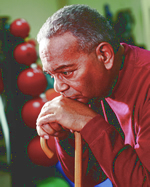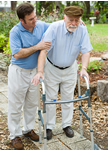Adapting to Disability

Ways to Understand Disability 
Stroke causes physical changes in people. These physical changes are sometimes called "disabilities". A disability may limit a person’s ability, activity, or role.
Your loved one may not like the word "disability." He or she may feel that it does not describe who they are. You do not have to use word "disability". People can learn to adapt to disability, or they can try to change the problem. Your loved one should also know that people with disabilities have rights.
Where Does Disability Come From?
The meaning of disability is not as simple as it may seem. People disagree about what it means. It is important to know that your loved one may experience disability in different ways. How you think about disability can shape how you respond to it.
Disability as a Physical Problem
Some people think disability is a physical restriction. These people may try to lessen the disability through rehabilitation. They may also try to change their attitude about disability (see "Disability as a Growth Experience" below).
Disability as a Societal Problem
Other people think the restriction is not physical at all. Instead, they think the restriction comes from prejudice in society. As a result, your loved one may face discrimination because of his or her disability (see "People with Disabilities Have Rights" below).
Disability as a Growth Experience
With time your loved one may find that stroke is not a tragedy. Over time, dealing with disability often becomes easier. Just like the stages of grief (see the Grieving and Emotional Recovery Factsheet), there are stages of disability.
Stage I: Realization
The first stage of disability is realization. In this stage, people struggle to understand what has happened. People may experience shock, expect to recover quickly, or mourn what they had before the stroke:
Shock – Shock is similar to denial. Shock and denial are normal survival strategies.
People who experience shock may think, "This can’t be happening," or "I will prove to myself that I have not changed."
Expecting recovery – Your loved one may have no desire to deal with disability since it is expected to vanish.
People who expect to recover quickly may think, "Something is truly wrong, but I’ll be my old self again in a few months."
Mourning – Distress, wanting to "give up," and depression are common.
People in mourning may think, "I’m smiling on the outside, but I’m sad inside," or "No human being is meant to live like this."
Stage II: Acceptance
The second stage is acceptance. During this stage, people’s attitudes toward disability begin to change. They may build up a defense against the world, or they may adjust their attitude:
Defense – Your loved one tries to cope. They still dislike their disabilities. They want to learn how to be as normal as possible. In this stage, people are beginning to accept their disabilities.
People in this stage may think, "I can live with it, but I don’t have to like it!"
Adjustment – Acceptance of disability changes gradually over the span of years. Disability is seen as a problem that can be solved.
People adjusting to disability may think, "It is what it is and I’ve learned how to deal with it."
Stage III: Embracing the Experience
In this stage, a person sees that without the disability, he or she would not be the same. There is no desire to be different. Disability, like all other life experiences, is seen as a chance for growth. Few people move to this level, but when they do, they are healthier for it.
People who embrace the disability may think, "I am a survivor, and I have learned how to appreciate life. My disability was a gift in disguise."
How to Help Your Loved One Move Forward
Your loved one should be allowed to try things they enjoyed before the stroke. Let them test their limits. The disability is likely to fade when your loved one can enjoy meaningful activities, like outings with friends or volunteering.
You can also help them be comfortable with being different. To some, being "normal" is dull and boring! Make life easier for people who are outside the box. Educate others about the importance of accepting differences. Disability improves growth and learning. People learn how to live without things they once thought they valued. Survivors of stroke can find new joys to replace the old ones.
People with Disabilities Have Rights!
It is healthy for your loved one to accept the disability. But, they do not have to accept the discrimination that comes with it. People with disabilities have rights. Your loved one should know his/her rights.
- Independent living programs help people with disabilities understand their rights. Every state in the U.S. has a Center for Independent Living that is a free-of-charge resource (See "Resources" for information).
- In every city, you can ask for information about accessible transit, hotels, and attractions for people with disabilities.
- Look for art therapies in your community that offer classes for people with disabilities. These include martial arts training, music, art, dance, poetry, and drama therapy.
- Reach out to other people who have lived with a disability for a long time. They may be able to offer a fresh outlook on life.
More Resources 
Additional credible resources on this topic can be found here. Website pages may change or update, therefore if a link does not work, you may also try to type the information into your internet search bar. This Resource List will be updated frequently.
References: Kerr, N. (1977). Understanding the process of adjustment to disability. In J. Stubbins (Ed.), Psychosocial aspects of disability. Baltimore, MD: University Park; Vash, C.V. & Crewe, N.M. (2004). Psychology of Disability. New York: Springer.
These materials were created for the project:
Web-Based Informational Materials for Caregivers of Veterans Post-Stroke
Project Number SDP 06-327 funded by VA HSR&D Quality Enhancement Research Initiative (QUERI)



















